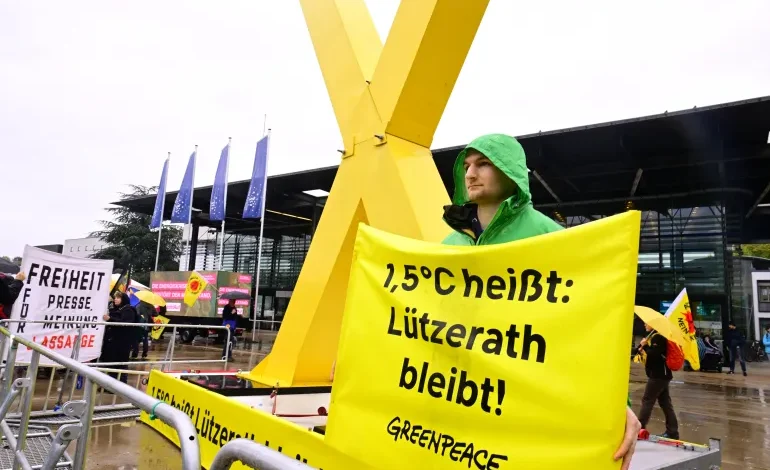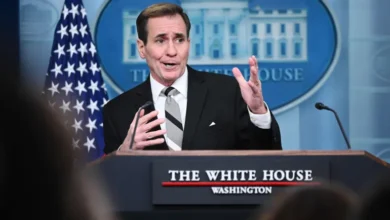The German Greens and the ills of green party politics
Clara S Thompson

Clara S Thompson
Earlier this month, the European Union was expected to vote on a law banning the sale of combustion-engine cars by 2035. But the legislation, which had been months in the making, was blocked by the German government which had initially supported it.
The about-face was yet another major disappointment for environmentalists coming from a government, which paradoxically includes a green party as a coalition partner.While it was the liberal Free Democratic Party pushing for this position within the coalition in order to get a concession favouring the car industry (which it succeeded in doing), this development demonstrated yet again how the Greens are struggling to push through an adequate climate agenda in Germany.
Just several weeks earlier, the leadership of that same Green Party watched on as the German police brutally cleared climate protesters trying to prevent the razing of the village of Lützerath to make way for the expansion of a lignite coal mine.
Worse still, that leadership participated in striking a deal with the coal mine’s owner, energy company RWE, which happens to be Europe’s single largest carbon emitter. They claimed the deal was good for the climate, as supposedly it was going to accelerate phasing out coal and thus help meet Germany’s climate goals.
Studies, however, have shown that this is not the case; if Germany is to meet the 1.5C temperature increase limit set in the Paris Agreement, which the German government has signed and said it will abide by, then it must stop burning coal within the next two or three years, not 2030.Last summer, the Greens also worked to open liquefied natural gas (LNG) terminals with contract terms of at least 15 years. The party leadership justified their actions with the “gas shortage” following the Russian invasion of Ukraine, but many of us environmentalists wondered why we need such long-term gas contracts that run way past the period necessary to expand renewable energy production to meet demand.
Looking at the policies the Green Party is supporting these days, one may think that it lost its ways and succumbed to realpolitik when it came to power at the federal level in 2021. But these “Einzelfälle” (isolated cases) – as the party leadership likes to frame them – of striking deals and making compromises on the climate agenda are not isolated at all.
Even before the Green Party joined Chancellor Olaf Scholz’s government, we were used to their leadership taking decisions that directly clashed with the party’s own political platform.
In the summer of 2020, for example, I was among the hundreds of protesters who protested the clearing of part of a 250-year-old forest in the German state of Hesse to make way for a highway.The Green Party’s minister of transport in Hesse, Tarek Al-Wazir, justified the decision to go forward with the construction by saying that it was taken democratically and was not the party’s responsibility.
Indeed, there is quite a track record of “isolated cases” in the Green Party’s recent history.
It is, therefore, hardly surprising that even with a green party in power, Germany is nowhere near fulfilling its plan to reduce emissions in order to meet the 1.5-degree target. According to Wolfgang Lucht, a sustainability science professor at Humboldt University, Germany is currently planning to emit about twice more CO2 than it could afford to within its Paris Agreement commitments.
The disappointment and frustration that many climate activists are feeling are hard to describe. Perhaps it suffices to say that after Lützerath, offices of the Green Party were attacked, occupied and decorated with “traitors” graffiti.
Many climate activists like myself believe that the top leadership of the party have grown too pragmatic and lost sight of their original goals of promoting climate justice. Indeed, it is difficult to see how green party politics in their current form can lead the way in ending Germany’s and the world’s dependence on fossil fuels and take the radical climate action needed to avert a climate apocalypse.
The question many of us are asking is whether we should give up on green politics, stop voting for the party and focus our energy on the climate movement, which is unrestrained by narrow partisan interests and corporate pressure. Some members of the Greens already have made that choice by leaving the party.
But, as emotions run high, it is important to think strategically. If we give up on the Green Party, wouldn’t we lose an important tool – one of just a few at our disposal – to affect change at the political level? And wouldn’t that play into the hands of the “enemy” – the big corporate polluters?
It is clear that green parties are unlikely to follow the same radical agenda as the climate movement. They face harsh dilemmas when in power, as they navigate the complexities of policymaking and balance the demands of their voters with the realities of governing in a coalition.
But that does not mean that we should give up and stop pressuring them to live up to their electoral promises. And it does not mean that we should close our eyes to the fact that many within the party itself disprove of striking deals with big corporations and succumbing to pressure from various lobbies.
Young members of the party, called the “Green Youth”, have been speaking up and criticising the leadership for their controversial decisions. They seem quite eager to change the course the party has taken and have been conspicuously present at climate protests, including at Lützerath.










